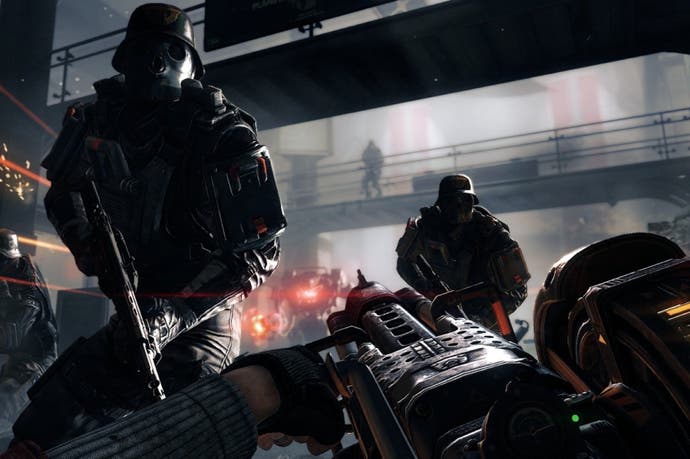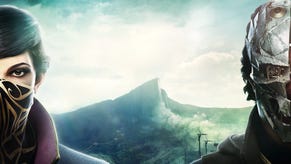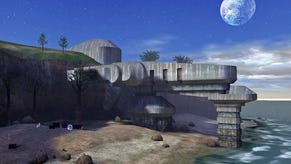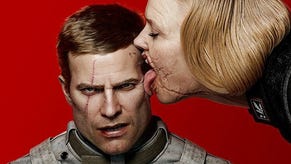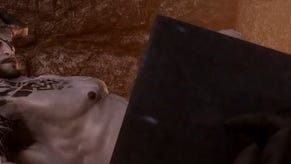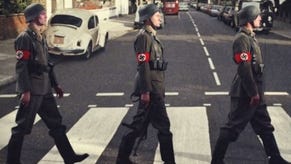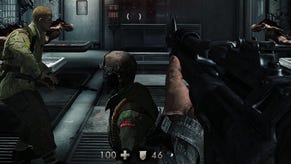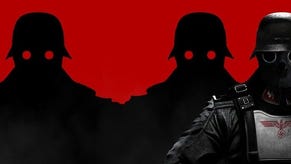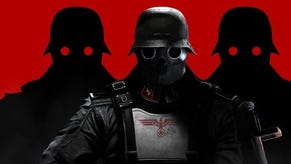Wolfenstein's New Order: How MachineGames is resurrecting a classic
From Tarantino to Batman, what's set the new Wolfenstein's world in motion.
Jens Matthies is feeling a little flat. It's not that he's unhappy with his lot, or with the work put in by his team at MachineGames, the Swedish studio based in the city of Uppsala that's finishing up on its first ever project, Wolfenstein: The New Order. It's that Matthies' active role on the game is complete, and a journey that's spanned some five years is at last winding towards its conclusion.
"It feels a little empty when it's all done," says Matthies, who served as an art director at Starbreeze before splintering off with six of his co-workers to found MachineGames. "But it's also something you've been looking forward to for a long time. So it's happy, and it's a little sad at the same time."
Matthies' time at Starbreeze saw happiness tinged with sadness, though not always for the best of reasons. The Stockholm developer built up a reputation for visually stunning, mechanically robust first-person shooters off the back of 2004's The Chronicles of Riddick: Escape from Butcher Bay, a reputation upheld by the stylish, smart comic adaptation The Darkness. Things weren't quite so sweet, however, during an at times turbulent partnership with EA: one project based on the Jason Bourne licence was cancelled outright while another, what would become the 2012 reboot of Syndicate, failed to deliver on its potential.
"It's always hard when interests are misaligned between the publisher and other factors within the company," says Mathies. "At some point you have to make a choice, and either I stay on here just for the paycheque, and the game will be what it will be, or I put myself in a position where I can make the greatest possible game that I can."
Matthies had been with Starbreeze since its inception, playing a key part in evolving the studio, but after an 11 year stint he - alongside co-workers Magnus Högdahl Fredrik Ljungdahl, Jim Kjellin, Kjell Emanuelsson, Michael Wynne and Jerk Gustafsson - decided it was time to move on. "In 2009 we felt like the opportunity that you need in order to make a really great triple-A title these days, they have to be so fundamentally sound that we felt like the best way of doing that would be to start a new studio and create all the elements from which you could grow a really great game."
Stepping out from the relative security of an established studio, no matter how turbulent it may have been, was doubtless a brave step, and Matthies says the 18 months after the split were scary ones - when there was no major backing, no major clients and nothing beyond a gamble on the team's joint dream to make the game they wanted to make. Then, in 2010, an impressive suitor came along. Bethesda, on a small spree that also saw the acquisition of Dishonored developer Arkane and Shinji Mikami's Tango Gameworks, liked what it saw a the nascent MachineGames, and made it part of the fast-growing family.
It couldn't have worked out any better for Matthies and his team, no doubt tired of the wrangling that came when acting as guns for hire on games for external publishers. "When you're a third-party developer, you have to deal with problems like gaps between projects, arbitrary deadlines - these kinds of things that aren't conducive to the greatest possible quality in a game."
"For us, the only thing we really care about is delivering the best possible experience we can, and if that experience doesn't include multiplayer it shouldn't be in there."
It helped, too, that just over a year before Bethesda had acquired MachineGames it had also bought out another developer famed for its first-person shooters, though it was one with a little more heritage than the Swedish outfit. Matthies won't mind the comparison - he's a bigger fan of id Software than most. "I know for a fact I wouldn't be a game developer if it wasn't for Quake," he says, bristling with enthusiasm. "It opened up this avenue for normal people like me to start creating content and make games at home essentially. Those were the things that led me to Starbreeze, and allowed me to have a career."
Being part of the same stable was obviously appealing, as too was the prospect of working with some of the licences that were formative in MachineGames' education - even if that wasn't always the plan. "We were essentially agnostic in terms of specific IP," says Matthies. "But of course there are things that we gravitate towards, and that we really love, and fundamentally we're huge Wolfenstein fans." The way Matthies tells it, the move to work on one of id's most iconic series was surprisingly straightforward. "We just asked if anyone was working on Wolfenstein, and they said nobody was," he says. MachineGames simply asked if they could work on a new entry - "And then, you know," Matthies says flatly, "we got it."
MachineGames' cause was no doubt helped by the fact the developer really gets Wolfenstein too. There's a touching reverence with which id's 1992 Wolfenstein 3D is held, most notably in an early level that explores a castle complete with collectable trinkets and secret panels sliding away to reveal glistening treasure chests. It's there, too, in the thundering preposterousness of Wolfenstein's arsenal - all told with the kind of muscle and imagination that'll be familiar with players of Starbreeze's celebrated shooters - and its celebration of over-the-top action. Having id to hand has helped MachineGames nail the spirit, even if it hasn't held it back from exploring new avenues.
"We didn't want to do anything that violates the legacy," says Matthies. "We started to look at all of the Wolfenstein games, because it's been taken in quite a lot of different directions over the years - and what we felt resonated most strongly with us is the original Wolfenstein 3D. All the seeds of what we wanted to do were in there - you have things like Mecha Hitler and all these outlandish ideas, they're already there. We wanted to make a modern celebration of that. That's our fundamental inspiration, Wolfenstein 3D, but of course we honour in as much as is possible all of the Wolfenstein games, and if you want to see it as a direct sequel to the previous one you can do that. But obviously the New Order is quite a significant leap in a direction we haven't really seen before."
Wolfenstein: The New Order has its own flavour, and it's a curious one at that. There's a blend of play types, from dual-wielding sniper rifles to tip-toeing through hospitals, which help introduce a variety of textures to a resolutely single-player experience, as well as a blend of tones that's initially a little jarring. Wolfenstein: The New Order has its moments of out-and-out bombast, where robotic dogs prance along a debris-strewn coastline making a merry dance for your jugular, but more unexpectedly it also has moments more sombre in tone: a rip-roaring introduction gives way to a more reflective segue in which we see our hero BJ Blazkowicz sit wide-eyed and helpless in an asylum as horror of the victorious Nazis plays out in front of him.
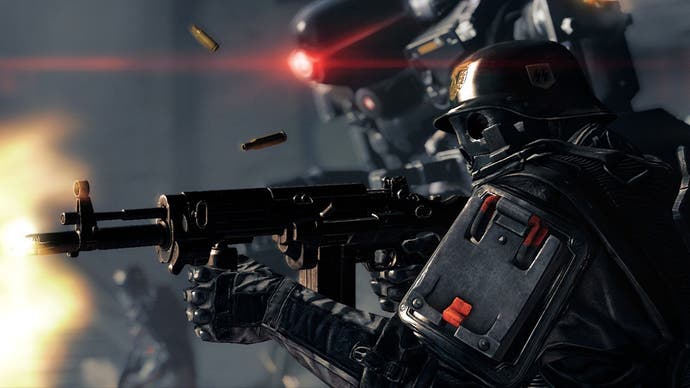
"It has this insane action and things occurring, and in other moments it's incredibly intimate, with very serious drama," says Matthies, citing Quentin Tarantino's 2009 film Inglorious Basterds as a key reference point. "We thought that was the approach to this material, because on the one hand you have these larger than life characters with names like Deathhead and BJ Blazkowicz, and there's this muscle-bound 80s action hero. But it's also in a context that has to do with the greatest atrocity ever, that human-kind has ever suffered through with the Nazi war crimes and their attempt to take over the world. In its fundamentals, it has these two dimensions already. Even in Wolfenstein 3D, those are fundamental aspects of this world, and that's what we wanted to build upon, and we wanted to layer on character depth and drama so that you could feel something with this over-the-top mayhem and cool retro sci-fi world."
Seeing the twisted fantasy world as laid out by a small group of men in their early twenties with Wolfenstein 3D being given a more straight-faced treatment is initially disconcerting, though perhaps that only goes to speak for how Nazis have become meaningless window dressing in so many games. "I think it stays where we feel comfortable," continues Matthies, before citing Nolan's Batman series as an example of a successful mix of the camp and the serious. "If you look at the Dark Knight, it's a dude dressed up like a bat and his enemy's dressed up like a clown. It's all very silly in the fundamentals, but if you approach it from a dramatic angle, you can make a worthwhile vision with that. You can contrast that to the 60s TV show version of Batman, where they went cleanly with a guy in a bat costume and a guy dressed as a clown, so let's just make something camp - and what you end up with is something that's way less compelling.
"We feel this is the appropriate approach - and it also connects to what the Nazis are about, because while we have Nazi characters that are larger than life and grandiose, we didn't want to undermine the attitude of the ideology, if that makes sense. So it's really important for us to make those moments, to put the player in a position where you really understand what they're about. Even though it's painted on this larger-than-life canvas, it's emotionally truthful to the Nazi ideology, so that's how we approached it."
It's an approach that makes for some uncomfortable moments between the fury of the game in action, though credit's due to MachineGames for sticking to its vision - and to Bethesda, for sticking behind them. Matthies believes a game Wolfenstein: The New Order wouldn't be possible without its status as a first-party developer within Bethesda, a company he says is more liberal than those he's had experience with in the past. "We're with a publisher who's very sympathetic to quality, and it's not as marketing driven as other publishers are," says Matthies. "They're quality driven, first and foremost."
It's that philosophy, Matthies says, that also allowed for one of Wolfenstein: The New Order's bolder moves: it's a modern first-person shooter shipping without a multiplayer mode, something which would surely be anathema to other publishers. "I think that's a testament to the integrity of Bethesda, especially if you're an independent developer - you have a huge amount of pressure to include stuff just so they could write it on the box," he says. "For us, the only thing we really care about is delivering the best possible experience we can, and if that experience doesn't include multiplayer there shouldn't be multiplayer in there. So we just talked to Bethesda and said the best game we could make would be focussing the entire studio on really strong single-player, and they were perfectly happy with that - they have a track record of selling single-player only games, and they sell because of their quality. There wasn't ever a debate - it felt like the right thing to do, and that's what we did."
How well that gamble's paid off will become clear when Wolfenstein: The New Order releases on May 20, though Matthies is hoping that MachineGames' journey won't end there. "We have lots of ideas for a sequel! And also we've never had the opportunity to do a sequel before - every time we've done a new game it's always been something different. So we planted a lot of seeds in this game to build upon, and we have some really strong ideas of where we can take it, so fingers crossed that's what will happen, but obviously it all depends on the financial success of New Order."
